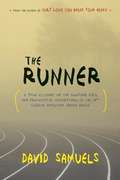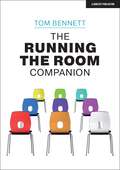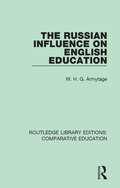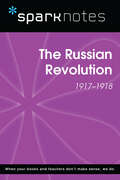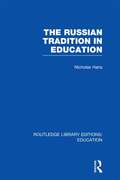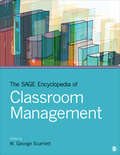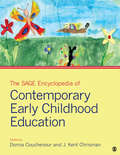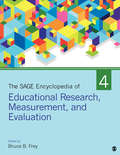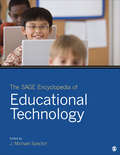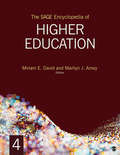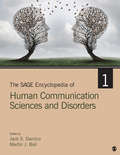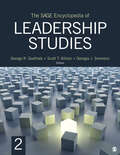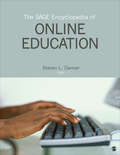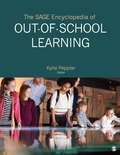- Table View
- List View
The Runaways
by Victor CanningFifteen-year-old Smiler escapes from an English reform school and takes refuge in a deserted barn during a storm. He discovers that a young cheetah fleeing from a Lion Park is also seeking shelter. A touching relationship develops between the two creatures who insist upon their freedom.
The Runner: A True Account Of The Amazing Lies And Fantastical Adventures Of The Ivy League Impostor James Hogue
by David Samuels<P>A true tale based on an acclaimed New Yorker article follows the efforts of a homeless itinerant who assumed a false identity was accepted at Princeton University, an endeavor during which he dated a millionaire's daughter, achieved top grades and gained entry into the elite Ivy Club before his deception was exposed.
The Running the Room Companion: Issues in classroom management and strategies to deal with them
by Tom BennettIn Running the Room: The Teacher's Guide to Behaviour, Tom Bennett rewrote the book on behaviour management, and outlined the psychology and dynamics underpinning student habits. In this companion, he goes into more detail about how to apply those principles to the classroom. Addressing a wide range of circumstances, he explores popular teacher dilemmas such as:How to deal with students who are late?What are the best ways to work with parents?Managing cover lessons successfullyHow to tame smartphonesThe best way to design a seating planHow to start the lesson for the first timeDealing with low-level disruptionGetting the class quiet when you – and they – need it the mostAnd many more. Using practical examples and evidence-informed techniques, Tom demystifies the puzzles that complex behaviour often presents, and guides teachers new and old carefully to a better understanding of how to run the room they way everyone deserves.
The Running the Room Companion: Issues in classroom management and strategies to deal with them
by Tom BennettIn Running the Room: The Teacher's Guide to Behaviour, Tom Bennett rewrote the book on behaviour management, and outlined the psychology and dynamics underpinning student habits. In this companion, he goes into more detail about how to apply those principles to the classroom. Addressing a wide range of circumstances, he explores popular teacher dilemmas such as:How to deal with students who are late?What are the best ways to work with parents?Managing cover lessons successfullyHow to tame smartphonesThe best way to design a seating planHow to start the lesson for the first timeDealing with low-level disruptionGetting the class quiet when you – and they – need it the mostAnd many more. Using practical examples and evidence-informed techniques, Tom demystifies the puzzles that complex behaviour often presents, and guides teachers new and old carefully to a better understanding of how to run the room they way everyone deserves.
The Russian Influence on English Education (Routledge Library Editions: Comparative Education)
by W. H. ArmytageOriginally published in 1969. British merchants first penetrated to Moscow in the early 16th century. From that time until today developments in Russia have influenced Britain in innumerable ways - sometimes unexpectedly. In this volume Professor Armytage traces this influence, showing how Tolstoy, Kropotkin and others better known for their activities in fields other than education, have, in fact, had their effect on education in Britain. The lively account of the way in which these ideas have found their way into the British system shows that recent influences have been more direct. In particular the rapid development of higher technological education owes a great deal to the Russian example.
The Russian Revolution (SparkNotes History Notes)
by SparkNotesThe Russian Revolution (1917-1918) (SparkNotes History Note) Making the reading experience fun! SparkNotes History Guides help students strengthen their grasp of history by focusing on individual eras or episodes in U.S. or world history. Breaking history up into digestible lessons, the History Guides make it easier for students to see how events, figures, movements, and trends interrelate. SparkNotes History Guides are perfect for high school and college history classes, for students studying for History AP Test or SAT Subject Tests, and simply as general reference tools.Each note contains a general overview of historical context, a concise summary of events, lists of key people and terms, in-depth summary and analysis with timelines, study questions and suggested essay topics, and a 50-question review quiz.
The Russian Tradition in Education (Routledge Library Editions: Education)
by Nicholas HansThis volume describes the Russian tradition in education and in particular the dominant role of Russian nationality. The whole history of Russian education is covered from Peter the Great to Khruschev.
The SAGE Encyclopedia of Classroom Management
by W. George ScarlettA teacher’s ability to manage the classroom strongly influences the quality of teaching and learning that can be accomplished. Among the most pressing concerns for inexperienced teachers is classroom management, a concern of equal importance to the general public in light of behavior problems and breakdowns in discipline that grab newspaper headlines. But classroom management is not just about problems and what to do when things go wrong and chaos erupts. It’s about how to run a classroom so as to elicit the best from even the most courteous group of students. An array of skills is needed to produce such a learning environment. The SAGE Encyclopedia of Classroom Management raises issues and introduces evidence-based, real-world strategies for creating and maintaining well-managed classrooms where learning thrives. Students studying to become teachers will need to develop their own classroom management strategies consistent with their own philosophies of teaching and learning. This work aims to open their eyes to the range of issues and the array of skills they might integrate into their unique teaching styles. Key Features: 325 signed entries organized in A-to-Z fashion across two volumes Reader′s Guide grouping related entries thematically References/Further Readings and Cross-References sections Chronology in the back matter Resource Guide in the appendix This encyclopedia is an excellent scholarly source for students who are pursuing a degree or position in the field of education. The SAGE Encyclopedia of Classroom Management is an ideal source for all academic and public libraries.
The SAGE Encyclopedia of Classroom Management
by W. George ScarlettA teacher’s ability to manage the classroom strongly influences the quality of teaching and learning that can be accomplished. Among the most pressing concerns for inexperienced teachers is classroom management, a concern of equal importance to the general public in light of behavior problems and breakdowns in discipline that grab newspaper headlines. But classroom management is not just about problems and what to do when things go wrong and chaos erupts. It’s about how to run a classroom so as to elicit the best from even the most courteous group of students. An array of skills is needed to produce such a learning environment. The SAGE Encyclopedia of Classroom Management raises issues and introduces evidence-based, real-world strategies for creating and maintaining well-managed classrooms where learning thrives. Students studying to become teachers will need to develop their own classroom management strategies consistent with their own philosophies of teaching and learning. This work aims to open their eyes to the range of issues and the array of skills they might integrate into their unique teaching styles. Key Features: 325 signed entries organized in A-to-Z fashion across two volumes Reader′s Guide grouping related entries thematically References/Further Readings and Cross-References sections Chronology in the back matter Resource Guide in the appendix This encyclopedia is an excellent scholarly source for students who are pursuing a degree or position in the field of education. The SAGE Encyclopedia of Classroom Management is an ideal source for all academic and public libraries.
The SAGE Encyclopedia of Contemporary Early Childhood Education
by J. Kent Chrisman Donna CouchenourThe general public often views early childhood education as either simply "babysitting" or as preparation for later learning. Of course, both viewpoints are simplistic. Deep understanding of child development, best educational practices based on development, emergent curriculum, cultural competence and applications of family systems are necessary for high-quality early education. Highly effective early childhood education is rare in that it requires collaboration and transitions among a variety of systems for children from birth through eight years of age. The SAGE Encyclopedia of Contemporary Early Childhood Education presents in three comprehensive volumes advanced research, accurate practical applications of research, historical foundations and key facts from the field of contemporary early childhood education. Through approximately 425 entries, this work includes all areas of child development – physical, cognitive, language, social, emotional, aesthetic – as well as comprehensive review of best educational practices with young children, effective preparation for early childhood professionals and policy making practices, and addresses such questions as: · How is the field of early childhood education defined? · What are the roots of this field of study? · How is the history of early childhood education similar to yet different from the study of public education? · What are the major influences on understandings of best practices in early childhood education?
The SAGE Encyclopedia of Contemporary Early Childhood Education
by J. Kent Chrisman Donna CouchenourThe general public often views early childhood education as either simply "babysitting" or as preparation for later learning. Of course, both viewpoints are simplistic. Deep understanding of child development, best educational practices based on development, emergent curriculum, cultural competence and applications of family systems are necessary for high-quality early education. Highly effective early childhood education is rare in that it requires collaboration and transitions among a variety of systems for children from birth through eight years of age. The SAGE Encyclopedia of Contemporary Early Childhood Education presents in three comprehensive volumes advanced research, accurate practical applications of research, historical foundations and key facts from the field of contemporary early childhood education. Through approximately 425 entries, this work includes all areas of child development – physical, cognitive, language, social, emotional, aesthetic – as well as comprehensive review of best educational practices with young children, effective preparation for early childhood professionals and policy making practices, and addresses such questions as: · How is the field of early childhood education defined? · What are the roots of this field of study? · How is the history of early childhood education similar to yet different from the study of public education? · What are the major influences on understandings of best practices in early childhood education?
The SAGE Encyclopedia of Educational Research, Measurement, and Evaluation
by Bruce B. FreyIn an era of curricular changes and experiments and high-stakes testing, educational measurement and evaluation is more important than ever. In addition to expected entries covering the basics of traditional theories and methods, other entries discuss important sociopolitical issues and trends influencing the future of that research and practice. Textbooks, handbooks, monographs and other publications focus on various aspects of educational research, measurement and evaluation, but to date, there exists no major reference guide for students new to the field. This comprehensive work fills that gap, covering traditional areas while pointing the way to future developments. Features: Nearly 700 signed entries are contained in an authoritative work spanning four volumes and available in choice of electronic and/or print formats. Although organized A-to-Z, front matter includes a Reader’s Guide grouping entries thematically to help students interested in a specific aspect of education research, measurement, and evaluation to more easily locate directly related entries. (For instance, sample themes include Data, Evaluation, Measurement Concepts & Issues, Research, Sociopolitical Issues, Standards.) Back matter includes a Chronology of the development of the field; a Resource Guide to classic books, journals, and associations; and a detailed Index. Entries conclude with References/Further Readings and Cross References to related entries. The Index, Reader’s Guide themes, and Cross References will combine to provide robust search-and-browse in the e-version.
The SAGE Encyclopedia of Educational Research, Measurement, and Evaluation
by Bruce B. FreyIn an era of curricular changes and experiments and high-stakes testing, educational measurement and evaluation is more important than ever. In addition to expected entries covering the basics of traditional theories and methods, other entries discuss important sociopolitical issues and trends influencing the future of that research and practice. Textbooks, handbooks, monographs and other publications focus on various aspects of educational research, measurement and evaluation, but to date, there exists no major reference guide for students new to the field. This comprehensive work fills that gap, covering traditional areas while pointing the way to future developments. Features: Nearly 700 signed entries are contained in an authoritative work spanning four volumes and available in choice of electronic and/or print formats. Although organized A-to-Z, front matter includes a Reader’s Guide grouping entries thematically to help students interested in a specific aspect of education research, measurement, and evaluation to more easily locate directly related entries. (For instance, sample themes include Data, Evaluation, Measurement Concepts & Issues, Research, Sociopolitical Issues, Standards.) Back matter includes a Chronology of the development of the field; a Resource Guide to classic books, journals, and associations; and a detailed Index. Entries conclude with References/Further Readings and Cross References to related entries. The Index, Reader’s Guide themes, and Cross References will combine to provide robust search-and-browse in the e-version.
The SAGE Encyclopedia of Educational Technology
by Professor J. Michael SpectorThe SAGE Encyclopedia of Educational Technology examines information on leveraging the power of technology to support teaching and learning. While using innovative technology to educate individuals is certainly not a new topic, how it is approached, adapted, and used toward the services of achieving real gains in student performance is extremely pertinent. This two-volume encyclopedia explores such issues, focusing on core topics and issues that will retain relevance in the face of perpetually evolving devices, services, and specific techniques. As technology evolves and becomes even more low-cost, easy-to-use, and more accessible, the education sector will evolve alongside it. For instance, issues surrounding reasoning behind how one study has shown students retain information better in traditional print formats are a topic explored within the pages of this new encyclopedia. Features: A collection of 300-350 entries are organized in A-to-Z fashion in 2 volumes available in a choice of print or electronic formats. Entries, authored by key figures in the field, conclude with cross references and further readings. A detailed index, the Reader’s Guide themes, and cross references combine for search-and-browse in the electronic version. This reference encyclopedia is a reliable and precise source on educational technology and a must-have reference for all academic libraries.
The SAGE Encyclopedia of Educational Technology
by Professor J. Michael SpectorThe SAGE Encyclopedia of Educational Technology examines information on leveraging the power of technology to support teaching and learning. While using innovative technology to educate individuals is certainly not a new topic, how it is approached, adapted, and used toward the services of achieving real gains in student performance is extremely pertinent. This two-volume encyclopedia explores such issues, focusing on core topics and issues that will retain relevance in the face of perpetually evolving devices, services, and specific techniques. As technology evolves and becomes even more low-cost, easy-to-use, and more accessible, the education sector will evolve alongside it. For instance, issues surrounding reasoning behind how one study has shown students retain information better in traditional print formats are a topic explored within the pages of this new encyclopedia. Features: A collection of 300-350 entries are organized in A-to-Z fashion in 2 volumes available in a choice of print or electronic formats. Entries, authored by key figures in the field, conclude with cross references and further readings. A detailed index, the Reader’s Guide themes, and cross references combine for search-and-browse in the electronic version. This reference encyclopedia is a reliable and precise source on educational technology and a must-have reference for all academic libraries.
The SAGE Encyclopedia of Higher Education
by Marilyn J. Amey Miriam E. DavidWith over 600 signed entries, The SAGE Encyclopedia of Higher Education demonstrates the impact higher education has had on global economies and universities across the world. Topics include: • students burdened with higher tuition fees • departments expected to produce courses and research that have clear and demonstrable social impact • what the university is and how it meets social and business requirements This encyclopedia touches on all aspects of higher education through: • key concepts • debates • approaches • schools of thought on higher education • role of universities As an interdisciplinary field, these volumes will prove to be an essential resource for students and researchers in education, sociology, politics and other related fields across the humanities and social science disciplines.
The SAGE Encyclopedia of Higher Education
by Marilyn J. Amey Miriam E. DavidWith over 600 signed entries, The SAGE Encyclopedia of Higher Education demonstrates the impact higher education has had on global economies and universities across the world. Topics include: • students burdened with higher tuition fees • departments expected to produce courses and research that have clear and demonstrable social impact • what the university is and how it meets social and business requirements This encyclopedia touches on all aspects of higher education through: • key concepts • debates • approaches • schools of thought on higher education • role of universities As an interdisciplinary field, these volumes will prove to be an essential resource for students and researchers in education, sociology, politics and other related fields across the humanities and social science disciplines.
The SAGE Encyclopedia of Human Communication Sciences and Disorders
by Dr Jack S. Damico Professor Martin J. BallThe SAGE Encyclopedia of Human Communication Sciences and Disorders is an in-depth encyclopedia aimed at students interested in interdisciplinary perspectives on human communication—both normal and disordered—across the lifespan. This timely and unique set will look at the spectrum of communication disorders, from causation and prevention to testing and assessment; through rehabilitation, intervention, and education. Examples of the interdisciplinary reach of this encyclopedia: A strong focus on health issues, with topics such as Asperger's syndrome, fetal alcohol syndrome, anatomy of the human larynx, dementia, etc. Including core psychology and cognitive sciences topics, such as social development, stigma, language acquisition, self-help groups, memory, depression, memory, Behaviorism, and cognitive development Education is covered in topics such as cooperative learning, special education, classroom-based service delivery The editors have recruited top researchers and clinicians across multiple fields to contribute to approximately 640 signed entries across four volumes.
The SAGE Encyclopedia of Human Communication Sciences and Disorders
by Dr Jack S. Damico Professor Martin J. BallThe SAGE Encyclopedia of Human Communication Sciences and Disorders is an in-depth encyclopedia aimed at students interested in interdisciplinary perspectives on human communication—both normal and disordered—across the lifespan. This timely and unique set will look at the spectrum of communication disorders, from causation and prevention to testing and assessment; through rehabilitation, intervention, and education. Examples of the interdisciplinary reach of this encyclopedia: A strong focus on health issues, with topics such as Asperger's syndrome, fetal alcohol syndrome, anatomy of the human larynx, dementia, etc. Including core psychology and cognitive sciences topics, such as social development, stigma, language acquisition, self-help groups, memory, depression, memory, Behaviorism, and cognitive development Education is covered in topics such as cooperative learning, special education, classroom-based service delivery The editors have recruited top researchers and clinicians across multiple fields to contribute to approximately 640 signed entries across four volumes.
The SAGE Encyclopedia of Leadership Studies
by George R. Goethals Georgia J. Sorenson Scott Townsend AllisonLeadership Studies is a multi-disciplinary academic exploration of the various aspects of how people get along, and how together they get things done. The fields that contribute to leadership studies include history, political science, psychology, anthropology, sociology, philosophy, literature, and behavioral economics. Leadership Studies is also about the ethical dimensions of human behavior. The discipline considers what leadership has been in the past (the historical view), what leadership actually looks like in the present (principally from the perspectives of the behavioral sciences and political science), and what leadership should be (the ethical perspective). The SAGE Encyclopedia of Leadership Studies will present both key concepts and research illuminating leadership and many of the most important events in human history that reveal the nuances of leadership, good and bad. Entries will include topics such as power, charisma, identity, persuasion, personality, social intelligence, gender, justice, unconscious conceptions of leadership, leader-follower relationships, and moral transformation.
The SAGE Encyclopedia of Leadership Studies
by George R. Goethals Georgia J. Sorenson Scott Townsend AllisonLeadership Studies is a multi-disciplinary academic exploration of the various aspects of how people get along, and how together they get things done. The fields that contribute to leadership studies include history, political science, psychology, anthropology, sociology, philosophy, literature, and behavioral economics. Leadership Studies is also about the ethical dimensions of human behavior. The discipline considers what leadership has been in the past (the historical view), what leadership actually looks like in the present (principally from the perspectives of the behavioral sciences and political science), and what leadership should be (the ethical perspective). The SAGE Encyclopedia of Leadership Studies will present both key concepts and research illuminating leadership and many of the most important events in human history that reveal the nuances of leadership, good and bad. Entries will include topics such as power, charisma, identity, persuasion, personality, social intelligence, gender, justice, unconscious conceptions of leadership, leader-follower relationships, and moral transformation.
The SAGE Encyclopedia of Online Education
by Dr Steven L. DanverOnline education, both by for-profit institutions and within traditional universities, has seen recent tremendous growth and appeal - but online education has many aspects that are not well understood. The SAGE Encyclopedia of Online Education provides a thorough and engaging reference on all aspects of this field, from the theoretical dimensions of teaching online to the technological aspects of implementing online courses—with a central focus on the effective education of students. Key topics explored through over 350 entries include: · Technology used in the online classroom · Institutions that have contributed to the growth of online education · Pedagogical basis and strategies of online education · Effectiveness and assessment · Different types of online education and best practices · The changing role of online education in the global education system
The SAGE Encyclopedia of Online Education
by Dr Steven L. DanverOnline education, both by for-profit institutions and within traditional universities, has seen recent tremendous growth and appeal - but online education has many aspects that are not well understood. The SAGE Encyclopedia of Online Education provides a thorough and engaging reference on all aspects of this field, from the theoretical dimensions of teaching online to the technological aspects of implementing online courses—with a central focus on the effective education of students. Key topics explored through over 350 entries include: · Technology used in the online classroom · Institutions that have contributed to the growth of online education · Pedagogical basis and strategies of online education · Effectiveness and assessment · Different types of online education and best practices · The changing role of online education in the global education system
The SAGE Encyclopedia of Out-of-School Learning
by Dr Kylie A. PepplerThe SAGE Encyclopedia of Out-of-School Learning documents what the best research has revealed about out-of-school learning: what facilitates or hampers it; where it takes place most effectively; how we can encourage it to develop talents and strengthen communities; and why it matters. Key features include: Approximately 260 articles organized A-to-Z in 2 volumes available in a choice of electronic or print formats. Signed articles, specially commissioned for this work and authored by key figures in the field, conclude with Cross References and Further Readings to guide students to the next step in a research journey. Reader’s Guide groups related articles within broad, thematic areas to make it easy for readers to spot additional relevant articles at a glance. Detailed Index, the Reader’s Guide, and Cross References combine for search-and-browse in the electronic version. Resource Guide points to classic books, journals, and web sites, including those of key associations.
The SAGE Encyclopedia of Out-of-School Learning
by Dr Kylie A. PepplerThe SAGE Encyclopedia of Out-of-School Learning documents what the best research has revealed about out-of-school learning: what facilitates or hampers it; where it takes place most effectively; how we can encourage it to develop talents and strengthen communities; and why it matters. Key features include: Approximately 260 articles organized A-to-Z in 2 volumes available in a choice of electronic or print formats. Signed articles, specially commissioned for this work and authored by key figures in the field, conclude with Cross References and Further Readings to guide students to the next step in a research journey. Reader’s Guide groups related articles within broad, thematic areas to make it easy for readers to spot additional relevant articles at a glance. Detailed Index, the Reader’s Guide, and Cross References combine for search-and-browse in the electronic version. Resource Guide points to classic books, journals, and web sites, including those of key associations.

